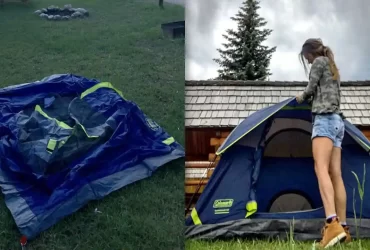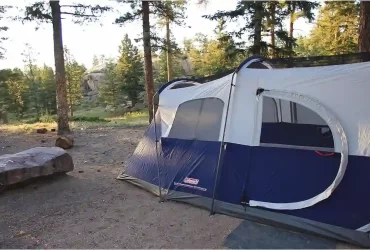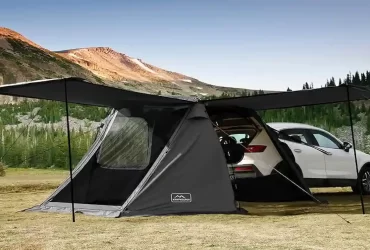Keep reading if you’re interested in finding out what makes a flashlight great for camping and what considerations you should take when purchasing one! You should look for flashlights with at least 50 lumens if you’re going camping, while anything over 500 lumens will be adequate. Since the human eye is capable of observing objects from about 350 feet away, this is enough illumination for most purposes.
Seeing things becomes significantly more difficult as the sun sets and darkness falls. As a result, cooking dinner or washing up after eating is difficult without artificial lighting. A flashlight makes seeing at night much easier, and there are different models available.
Lightweight and portable flashlights are ideal for camping because they are ideal for carrying around. With this design, they can easily fit inside your luggage or be stuffed inside a backpack without causing any problems. You might not know which flashlight is the best for you since there are so many different types on the market. Keep reading to find out which flashlights make the best camping lanterns!
Why Are Lumens Important?
Lumens are units of the International System of Units that represent the amount of light emitted through a solid angle by a source radiating in all directions equally with one-candela intensity. Their use can be put to good use in measuring light density. The advertised lumen output of a light source tells us how far the light can travel. In camping flashlights, lumens play an important role
As your light source becomes stronger, you can see further, which results in more lumens. The importance of considering lumens when camping is already well-known to many, but here are some specific lumen guidelines you’ll want to know.
Camping Gear Lumens Needed:

With more knowledge of lumens, you can move on to thinking about what equipment you’ll be taking. We’ve already mentioned that bright flashlights should have lumens of at least 200, but that doesn’t mean you should just go with one that has 200 lumens.
Bringing too much light along can cause problems for new campers, so it’s best to bring more than you think you’ll need. The three recommendations we make below aren’t merely suggestions – we’d argue they’re essentials.
Camping Lantern Lumens
A camping lantern is a next thing you should consider. The flashlight is an essential piece of equipment that people often overlook, but you should bring it as well. It is important to have a camping lantern on hand if you are planning on sitting outside after dark to enjoy yourselves and talk with each other.
As always, 200 lumens should do the trick without being too excessive or inconsiderate of other campers. Using a camping lantern inside your tent isn’t a good use of 200 lumens and it will seem too bright to us. The recommended light level for indoor use is around 100 lumens.
Those of you who are new to camping and who hoped you could just light a campfire after dark should be extremely cautious. Some campsites forbid it expressly, while others have specific zones where you are allowed to do it. When you have children, building a campfire can be dangerous, so it is definitely safer to use a camping lantern instead of a fire.
Flashlight Lumens
Of the three lights we’re mentioning here, this will be the most convenient and most used. You should definitely try to source one with this higher lumen count if you’d feel safer with something that goes up to 2000 lumens. As an additional tip, we would also recommend packing plenty of spare batteries for your flashlight. That’s all we can add.
No matter how long you’re staying, you’ll need your flashlight more often than you think, so bring lots of batteries rather than find yourself stranded in the dark with no batteries on a long weekend. Last but not least, narrow-beam flashlights are often the most effective while camping for many reasons.
First of all, your light will not illuminate such a wide area as to disturb other campers. Additionally, it gives you a much better sense of where you’re going, so you can focus on what’s directly in front of you, which is a much safer practice. Furthermore, if you want the highest lumen options out there, then you need a narrow beam. If you light the campsite ridiculously brightly, you will very likely get much dissatisfaction from your fellow campers.
Headlamp Lumens

A flashlight is a useful tool, but it does require that you carry it everywhere you go. Just as the sun begins to set, you can easily realize after dark that you left your flashlight in the tent as you went for a walk around dusk. It won’t be a problem if you wear a headlamp.
Additionally, a headlamp gives you more freedom of movement. If your trip, you can catch yourself easier, which is great from a safety standpoint. However, from a practical standpoint, it is invaluable. The things you’ll need while camping may be heavy until you need them, as you don’t know what you’ll need until you need them. With a headlamp instead of a flashlight, it will be much easier to grab water, food, supplies, and anything you need in the dark.
Our recommendation is for headlamps to have 100 lumens. The reason is that you have less control over the direction you point your light, and we don’t want to anger anyone by shining too brightly at them. Additionally, a headlamp can also be used for reading in the dark, so you won’t need a bright light for this. If you’re looking for a headlamp for your next trip, 100 lumens is a good target.
What Lumens Are Required for Camping?

It is widely believed that you should have at least 50 lumens, though many campers also think that the more you have, the better. A brightness of 150 to 200 lumens, which should be more than enough, can be found easily in torches and other light sources. You’ll be happy to know, though, that some flashlights can emit up to 2000 lumens if safety is of particular concern.




Leave a Reply
View Comments